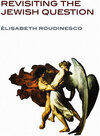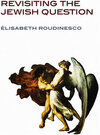
×
![Buchcover ISBN 9780745683744]()
"If, as Joyce wrote, history is a nightmare from which we aretrying to awake, this is even truer of the 'Jewish question'- a nightmare made up of myths and prejudice leading toanti-Semitism and to ancient but persistent wars of religion, suchas those opposing Arabs and Israelis. By adopting a French focuswhen revisiting these issues as treated by Marx, Freud, Sartre andArendt, Roudinesco brilliantly cleans the picture of its fog ofobfuscation. Thanks to her intimate knowledge of the facts andactors, we are shown a path to a new understanding; hopefully, itwill lead to an awakening.„
Jean-Michel Rabaté, University of Pennsylvania
“Élisabeth Roudinesco probes the toxic topic of Jew-hatred, ancient, mediaeval and newer, and of modern politicalanti-Semitism, trying to draw a clear distinction between them; adding to this, she analyses the recent phenomenon - of atotally different character - of anti-Zionism and/or thelegitimate criticism of the State of Israel and its politics. Theoutcome is courageous and timely in its argument for universal andenlightened jewishness; it also offers a highly rich and diversereading which is full of compelling twists and unexpected, refreshing deliberations."
Idith Zertal, University of Basel
Revisiting the Jewish Question
von Elisabeth RoudinescoWhat does it mean to be Jewish? What is an anti-Semite? Why doesthe enigmatic identity of the men who founded the firstmonotheistic religion arouse such passions?
We need to return to the Jewish question. We need, first, todistinguish between the anti-Judaism of medieval times, whichpersecuted the Jews, and the anti-Judaism of the Enlightenment, which emancipated them while being critical of their religion. Itis a mistake to confuse the two and see everyone from Voltaire toHitler as anti-Semitic in the same way. Then we need to focus onthe development of anti-Semitism in Europe, especially Vienna andParis, where the Zionist idea was born. Finally, we need toinvestigate the reception of Zionism both in the Arab countries andwithin the Diaspora.
Re-examining the Jewish question in the light of these distinctionsand investigations, Roudinesco shows that there is a permanenttension between the figures of the 'universal Jew' andthe 'territorial Jew'. Freud and Jung split partly overthis issue, which gained added intensity after the creation of theState of Israel in 1948 and the Eichmann trial in 1961. Finally, Roudinesco turns to the Holocaust deniers, who started to suggestthat the Jews had invented the genocide that befell their people, and to the increasing number of intellectual and literary figureswho have been accused of anti-Semitism.
This thorough re-examination of the Jewish question will be ofinterest to students and scholars of modern history andcontemporary thought and to a wide readership interested inanti-Semitism and the history of the Jews.
We need to return to the Jewish question. We need, first, todistinguish between the anti-Judaism of medieval times, whichpersecuted the Jews, and the anti-Judaism of the Enlightenment, which emancipated them while being critical of their religion. Itis a mistake to confuse the two and see everyone from Voltaire toHitler as anti-Semitic in the same way. Then we need to focus onthe development of anti-Semitism in Europe, especially Vienna andParis, where the Zionist idea was born. Finally, we need toinvestigate the reception of Zionism both in the Arab countries andwithin the Diaspora.
Re-examining the Jewish question in the light of these distinctionsand investigations, Roudinesco shows that there is a permanenttension between the figures of the 'universal Jew' andthe 'territorial Jew'. Freud and Jung split partly overthis issue, which gained added intensity after the creation of theState of Israel in 1948 and the Eichmann trial in 1961. Finally, Roudinesco turns to the Holocaust deniers, who started to suggestthat the Jews had invented the genocide that befell their people, and to the increasing number of intellectual and literary figureswho have been accused of anti-Semitism.
This thorough re-examination of the Jewish question will be ofinterest to students and scholars of modern history andcontemporary thought and to a wide readership interested inanti-Semitism and the history of the Jews.




